How You Can Be a Good Manager: 8 Key Characteristics to Lead a Successful Team
Discover the eight essential characteristics that every great manager needs to lead a successful team and optimize resource management effectively.
Being an exceptional manager is about more than overseeing tasks or meeting deadlines. It’s about inspiring your team, guiding them toward shared goals, and creating an environment where everyone can grow and succeed. Whether you’re new to leadership or aiming to sharpen your skills, mastering key traits can elevate your ability to manage team resources and drive outstanding results. This blog explores eight essential characteristics of a great manager, offering practical insights to help you lead with confidence and build a high-performing team.
Explaining Resource Management and Why A Good Manager Needs It
Resource management involves planning, allocating, and tracking resources, such as time, budget, and people, to achieve project goals efficiently. It’s about balancing workloads, assigning tasks wisely, and monitoring progress to ensure quality and timely results. Effective resource management boosts productivity and keeps teams aligned with objectives, making a team manager's job a lot more fluid and optimized.
For more tips and tools to master resource management, read our full blog on Explain Resource Management.
Core Qualities To Be A Good Manager
Great managers combine specific skills and behaviors to foster a productive, motivated, and cohesive team. Below are eight key characteristics that define successful leadership, each with actionable strategies to help you apply them effectively and improve resource management.
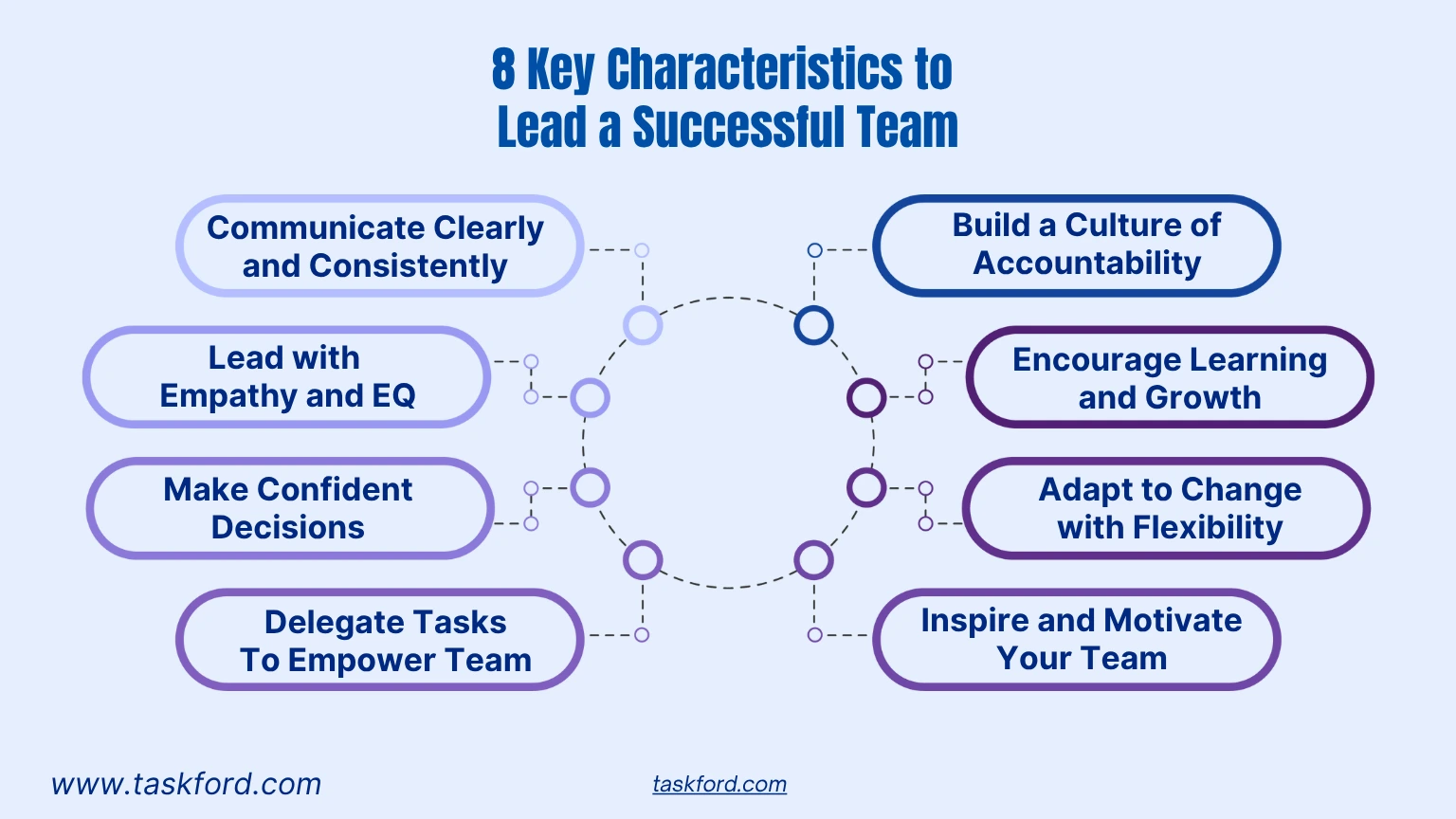
1. Communicate Clearly and Consistently
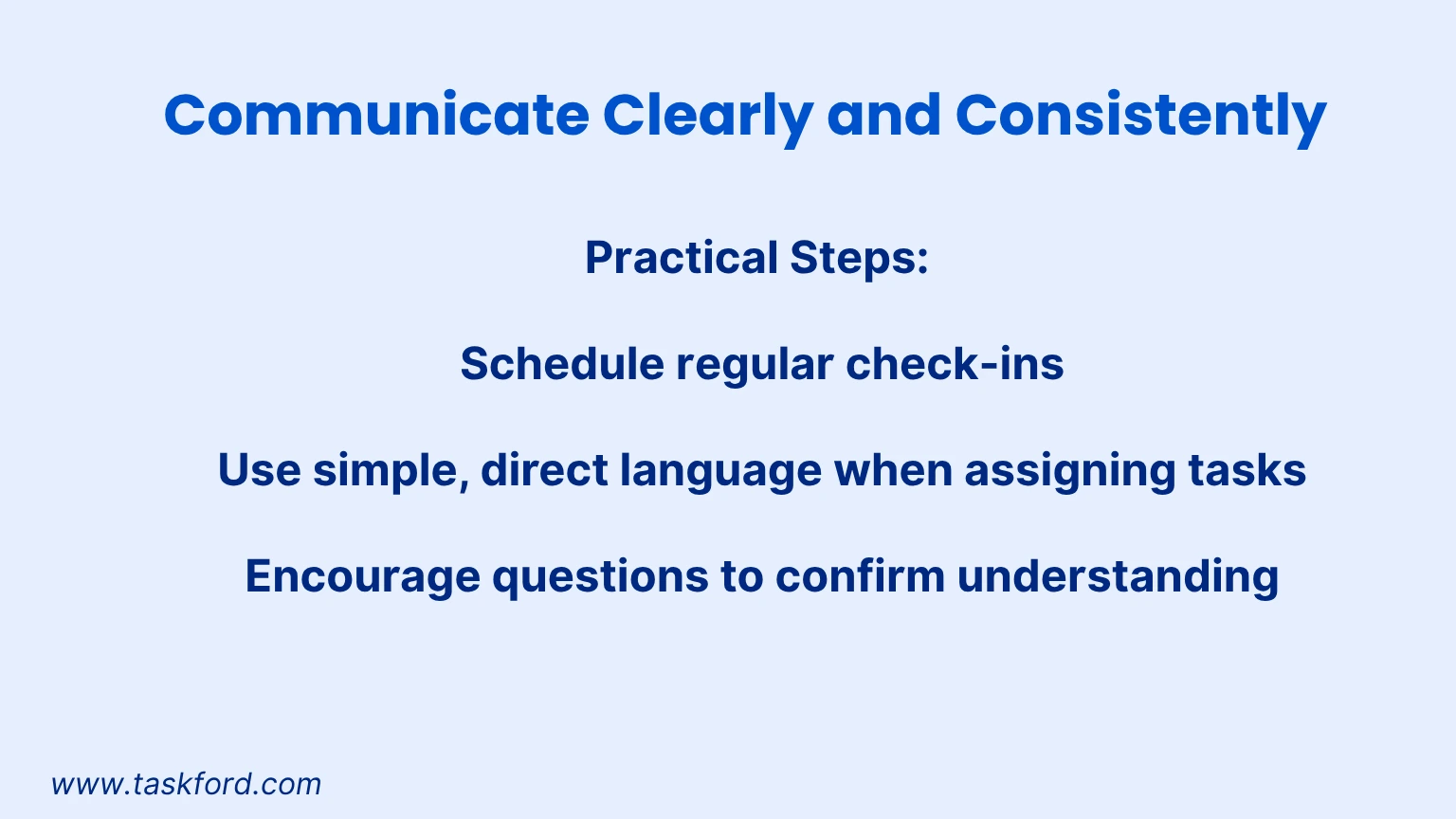
Effective communication forms the foundation of strong leadership. A good manager shares goals, expectations, and feedback clearly while actively listening to their team’s ideas, questions, and concerns.
- Why it matters: Clear communication aligns the team, reduces confusion, and ensures efficient use of resources. It builds trust and keeps everyone focused on common objectives.
- Practical steps: Schedule regular check-ins, such as weekly team meetings or one-on-one sessions, to discuss progress and priorities. Use simple, direct language when assigning tasks, explaining both the task and its purpose. Encourage questions to confirm understanding and create an open environment for feedback. For example, when starting a project, provide a clear brief with deadlines and goals, and follow up to ensure clarity.
- Pro tip: Use tools like TaskFord to share project updates and maintain transparent communication, keeping everyone aligned.
2. Lead with Empathy and Emotional Intelligence
Empathy allows managers to connect with their team on a personal level, understanding their motivations, challenges, and emotions. Emotional intelligence (EQ) helps you adapt your leadership style to meet individual needs, creating a supportive workplace.
-
Why it matters: Empathetic leadership boosts morale, reduces stress, and lowers turnover, fostering a culture where team members feel valued and motivated.
-
Practical steps: Practice active listening by giving your full attention during conversations and asking open-ended questions like, “How can I support you with this task?” Look for signs of burnout, such as missed deadlines or disengagement, and address them by redistributing tasks or offering flexibility. For example, if a team member seems overwhelmed, have a private conversation to understand their challenges and adjust their workload.
(Learn more: How To Reduce Burnout On A Project)
-
Pro tip: Build trust by showing genuine care, such as acknowledging personal milestones like work anniversaries or checking in during difficult times.
3. Make Confident Decisions and Solve Problems
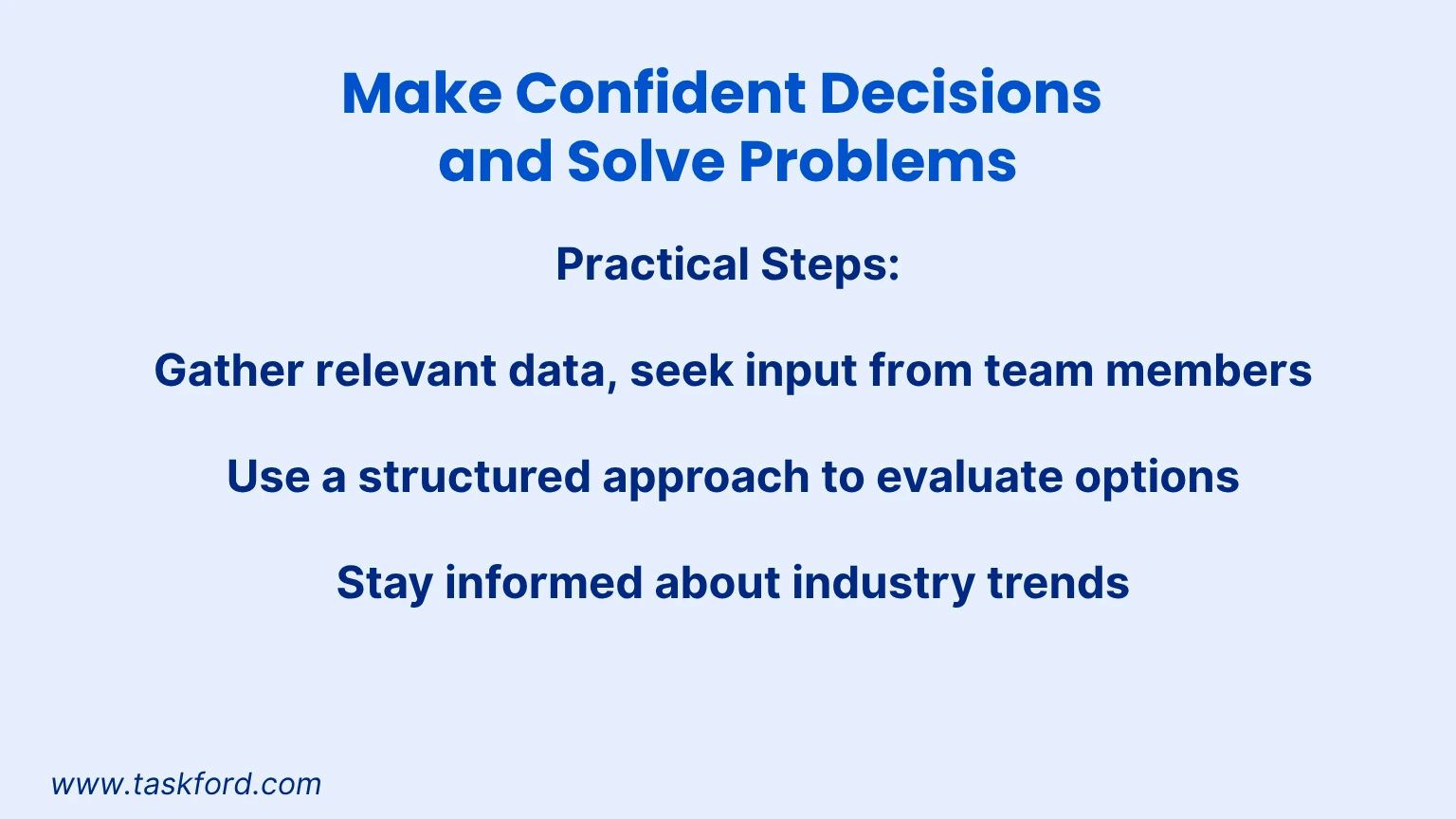
Great managers make informed, timely decisions and address challenges with a clear, solution-focused mindset. This skill is critical for managing resources effectively, as it involves allocating time, budget, and people wisely to achieve goals.
- Why it matters: Strong decision-making keeps projects on track, builds team confidence, and ensures resources are used efficiently, even under pressure.
- Practical steps: When faced with a challenge, gather relevant data and seek input from team members for diverse perspectives. For example, if a project is delayed, analyze resource allocation and decide whether to extend deadlines or add support. Use a structured approach, like listing pros and cons, to evaluate options. Stay informed about industry trends to make proactive decisions that align with organizational goals.
- Pro tip: Reflect on past decisions to identify what worked and what didn’t, refining your approach over time.
4. Delegate Tasks to Empower Your Team
Delegation involves assigning tasks strategically to match team members’ skills and growth potential, empowering them to take ownership and contribute meaningfully.
- Why it matters: Smart delegation maximizes productivity, builds confidence, and optimizes team resource management by leveraging individual strengths.
- Practical steps: Assess your team’s skills and assign tasks accordingly, such as giving data analysis to a numbers-savvy team member or creative tasks to someone with strong design skills. Provide clear instructions, including deadlines and expected outcomes, but allow flexibility for them to approach tasks in their own way. Check in periodically without micromanaging, offering feedback to keep tasks on track.
- Pro tip: Use project management tools like TaskFord, Asana and Wrike to monitor delegated tasks, ensuring clarity and accountability without constant oversight.
5. Build a Culture of Accountability
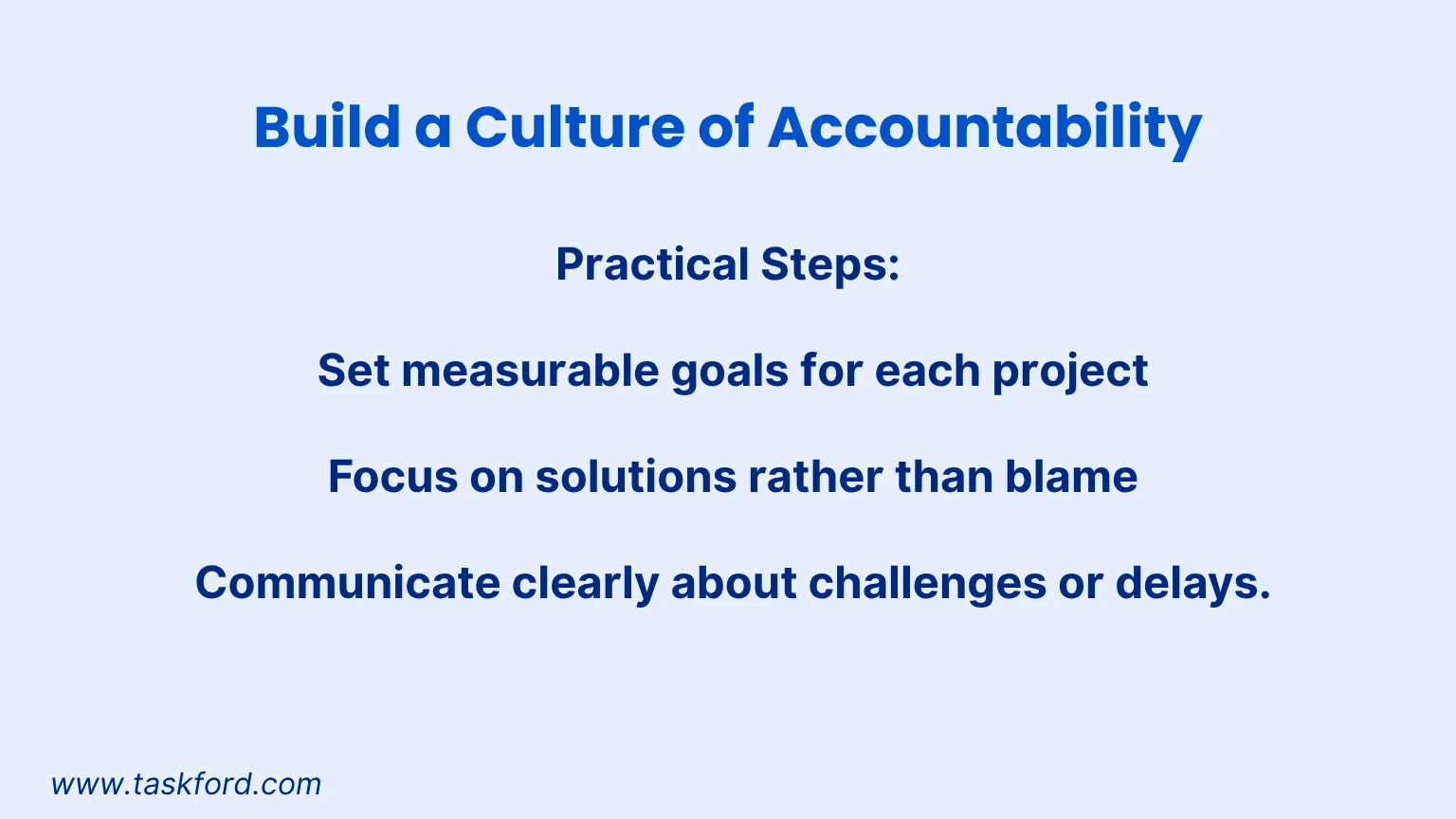
Accountability starts with the manager and sets the tone for the entire team. A good manager establishes clear expectations, follows through on commitments, and encourages everyone to take responsibility for their work.
- Why it matters: A culture of accountability ensures tasks are completed on time, resources are used effectively, and the team stays aligned with goals.
- Practical steps: Set measurable goals for each project, such as specific deliverables or deadlines, and track progress using tools like TaskFord. When mistakes occur, focus on solutions rather than blame, discussing what went wrong and how to improve. Model accountability by owning your decisions and communicating transparently about challenges or delays.
- Pro tip: Recognize team members who consistently meet expectations, reinforcing the value of accountability through positive feedback.
6. Encourage Continuous Learning and Growth
Great managers prioritize their team’s development, helping them build skills and stay adaptable in a fast-changing workplace.
- Why it matters: Investing in growth enhances team capabilities, boosts engagement, and equips your team to handle complex projects, improving resource management.
- Practical steps: Offer access to training programs, online courses, or workshops that align with your team’s roles. For example, provide training on a project management tool to improve time and task management. Encourage team members to share knowledge during meetings or collaborate on cross-functional projects to broaden their expertise. Support career goals by discussing long-term aspirations in one-on-one meetings.
- Pro tip: Create a learning culture by celebrating small wins, like completing a course or mastering a new skill, to keep the team motivated.
7. Adapt to Change with Flexibility
The ability to adapt to unexpected changes, whether in project priorities, team dynamics, or market conditions, is a hallmark of great leadership.
(Learn more: Clashing Priorities? Here's How to Solve Schedule Conflicts)
- Why it matters: Flexibility minimizes disruptions, keeps the team focused, and ensures resources are used effectively, even during uncertainty.
- Practical steps: Anticipate potential challenges by creating contingency plans, such as backup resources for critical tasks. If a team member leaves unexpectedly, quickly reassign responsibilities to maintain momentum. Stay open to new ideas and feedback, experimenting with different approaches to find what works best. For example, if a client changes project requirements, adjust timelines and communicate updates clearly to the team.
- Pro tip: Build resilience by encouraging your team to view change as an opportunity for growth, not a setback.
8. Inspire and Motivate Your Team
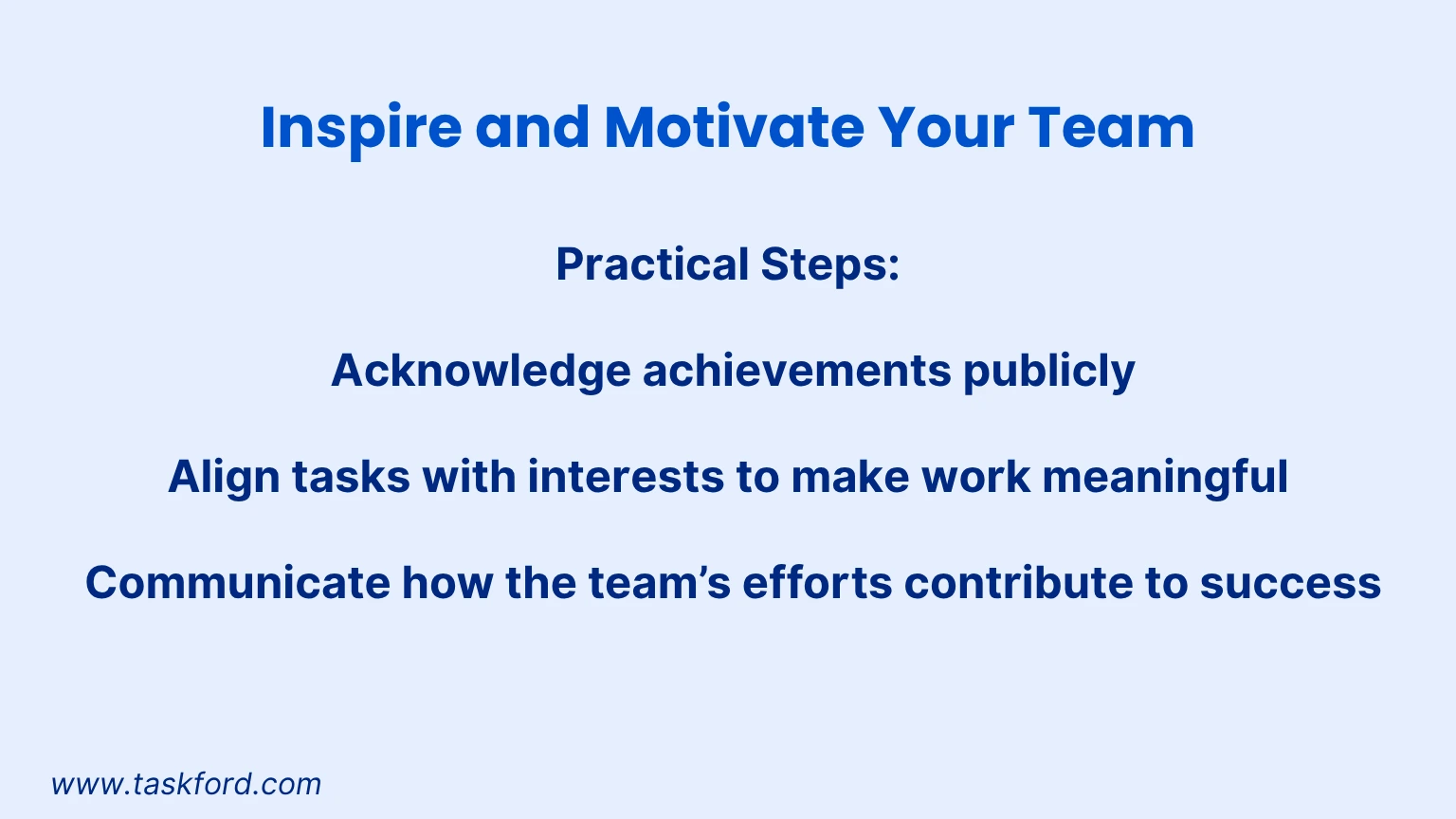
A great manager inspires their team by connecting their work to a larger purpose and recognizing their contributions, fostering a sense of pride and motivation.
- Why it matters: Motivated teams are more engaged, productive, and committed, leading to better outcomes and stronger team resource management.
- Practical steps: Acknowledge achievements publicly, such as praising a team member’s work in a meeting or sending a team-wide email to celebrate milestones. Align tasks with individual interests to make work meaningful, for example, letting a creative team member lead a campaign’s visual design. Communicate how the team’s efforts contribute to the organization’s success to give their work purpose.
- Pro tip: Foster a positive environment by encouraging collaboration and celebrating diversity, making every team member feel valued.
Actionable Tips to Practice These Characteristics
To become a better manager, focus on small, consistent steps to build these traits over time. Here are practical ways to start:
- Evaluate your strengths: Identify which characteristics you excel at and where you need growth. For example, if communication feels weak, prioritize clearer task instructions.
- Set specific goals: Focus on one or two traits each month, like improving empathy by checking in with team members weekly or enhancing delegation by assigning tasks based on skills.
- Leverage tools: Use platforms like TaskFord to manage tasks, track resources, and maintain transparency, allowing you to focus on leadership and optimize resource planning.
- Seek team feedback: Ask your team for honest input on your management style. Use their insights to adjust your approach and address any gaps.
- Invest in learning: Read leadership books, take online courses, or attend workshops to refine your skills. For example, a course on emotional intelligence can strengthen your ability to connect with your team.
- Model desired behaviors: Show the qualities you want in your team, like staying calm during challenges or being accountable for decisions, to inspire them to follow suit.
Conclusion
Being a great manager means mastering communication, empathy, decision-making, and other key traits while managing team resources effectively. By developing these eight characteristics, you can lead a team that thrives and delivers exceptional results. Start practicing these traits today, and explore how TaskFord can support your leadership journey. Visit TaskFord to discover tools that make resource management simple and effective.
Learn more
- What is Resource Planning? Definition, Examples and How to Do it Right
- Lack Of Resources? 7 Smart Ways to Deliver Results Anyway
- Top 7 Leadership Mistakes That Can Destroy Team Trust
Making work simpler,
smarter, and more connected
Join our waitlist and be notified first.

Related Blog
Subscribe for Expert Tips
Unlock expert insights and stay ahead with TaskFord. Sign up now to receive valuable tips, strategies, and updates directly in your inbox.






